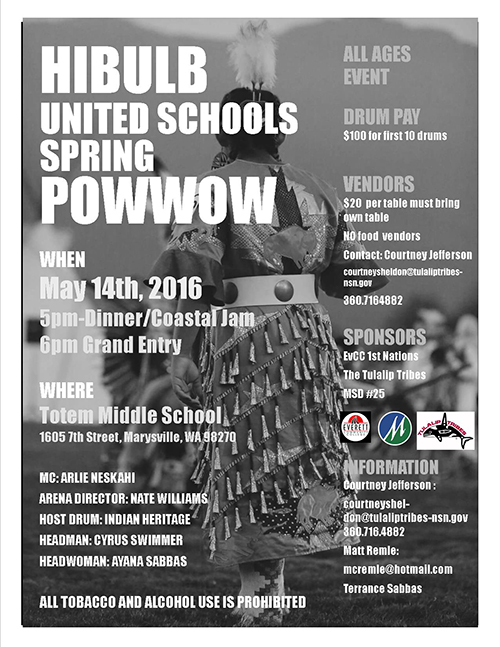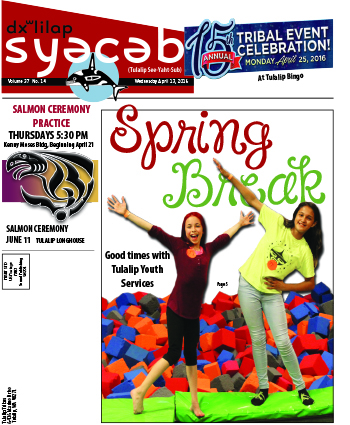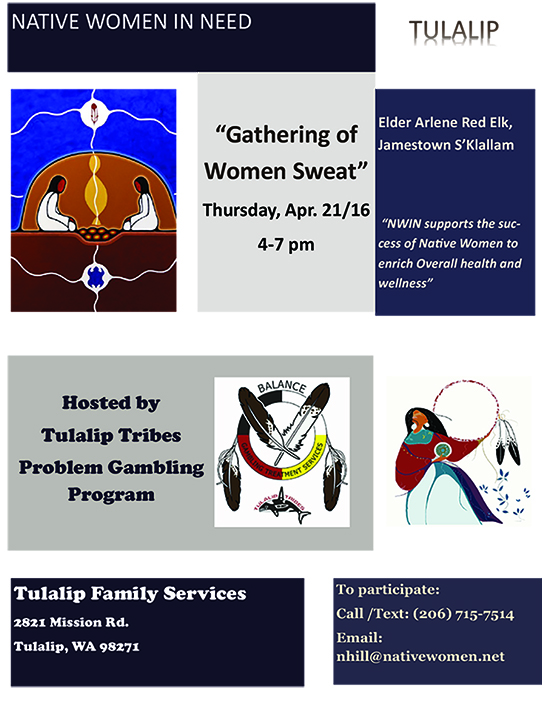Month: April 2016
Celebrating our youngest learners

Photo/Micheal Rios, Tulalip News
Article/photos by Micheal Rios
During the week of April 11-15, the Betty J. Taylor Early Learning Academy (TELA) celebrated the Week of the Young Child. The week was devoted to shining a light on the importance of early childhood development.
“All young children need and deserve high-quality early learning experiences that will prepare them for life, and Tulalip has a great opportunity to do our part to help young children,” stated Melinda Contraro, Professional Development Manager at TELA. “Week of the Young Child is a time for Tulalip to recognize that early years are learning years for all young children.”
Week of the Young Child is an annual celebration sponsored by the National Association for the Education of Young Children. Intended to celebrate early learning, young children, their teachers and families, the weeklong event is the perfect opportunity for early childhood programs to hold activities that bring awareness to the needs of young children.
Young children and their families depend on high-quality education and care, which help children get a great start and bring lasting benefits to Tulalip. Week of the Young Child is a time to recognize the importance of early learning and early literacy, and to celebrate the teachers and policies that bring early childhood education to young children.
“We will share some activities with our families and provide take home ideas for them to do with their children,” continued Melinda. “TELA has nearly 100 early childhood professionals working together to improve professional practice and working conditions in early childhood education, and to build public support for high-quality early childhood education programs.”
The week of fun and family friendly activities kicked off on Monday, April 11, with Music Monday. The reception area was transformed into a musical platform for Alley-Oop and his sunshine band of toddlers.
Music Monday: sing, dance, celebrate and learn. Through music, children develop math, language, and literacy skills all while having fun and being active.
Taco Tuesday: healthy eating and fitness at school. This fun, food-themed day is about more than just cheese and salsa. Cooking together connects math with literacy skills, science, and more. With the rise of childhood obesity, you can encourage healthy nutrition and fitness habits in the classroom by creating your own healthy tacos.
Work Together Wednesday: work together, build together, and learn together. When children build together they explore math and science concepts and develop their social and early literacy skills. Children can use any building material – from a fort of branches on the playground to a block city in the classroom.
Artsy Thursday: think, problem solve, create. Children develop creativity, social skills and fine motor skills with open-ended art projects where they can make choices, use their imaginations, and create with their hands. On Artsy Thursday celebrate the joy and learning children experience when engaged in creative art making.
Family Friday: sharing family stories. Engaging and celebrating families is at the heart of supporting our youngest learners. We applaud family members’ role as young children’s first and most important teachers.
Hibulb United Schools Spring Powwow, May 14
Annual Fishermen’s Meeting, April 21
Marysville School District provides free SAT exam to juniors on April 12
Contact: Marysville School District, www.msd25.org
April 13, 2016 syəcəb
Being Frank: Poor coho returns demands caution
By LORRAINE LOOMIS, Northwest Indian Fisheries Commission
There likely will be no coho fisheries in western Washington this year as returns are expected to plummet even further than last year because of poor ocean survival.
Coho returns in 2015 were as much as 80 percent below pre-season forecasts. The Nisqually Tribe canceled its coho fishery when fewer than 4,000 of the 23,000 fish expected actually returned. The same story was repeated in many Tribal fishing areas.
That’s why western Washington treaty Tribes are calling for greater caution in fisheries management planning this year and more equitable sharing with the state of the responsibility for conservation. It is important that we have agreement on in-season management methods and actions before the season starts.
Unlike sport fishermen who can go where fishing is best, Tribal fishermen are bound by treaty to traditional fishing places located mostly in terminal areas — such as rivers and bays — that are the end of the line for returning salmon.
Every year, we must wait and hope that enough fish return to feed our families and culture. Faced with low catch rates last year, however, most Tribal coho fisheries were sharply reduced or closed early to protect the resource. The state, however, expanded sport harvest in mixed stock areas last year to attempt to catch fish that weren’t there.
That’s not right. The last fisheries in line should not be forced to shoulder most of the responsibility for conserving the resource.
Making matters worse, lack of monitoring by federal fisheries managers last year allowed Southeast Alaska commercial fishermen to exceed their harvest quota by more than 100,000 chinook. Most of those fish were bound for Washington waters.
Coho salmon that managed to make it back last year showed frightening effects of poor ocean conditions. Most were 20 to 30 percent smaller than normal. Females returned with about 40 percent fewer eggs. That will likely result in lower natural and hatchery production and fewer fish in the future.
Right now, what salmon need is plenty of good habitat to increase stock abundance and build resiliency to survive the impacts of climate change and poor ocean conditions. Sadly, salmon habitat continues to be lost and damaged faster than it can be restored, threatening the future of the salmon and tribal treaty-reserved harvest rights.
Fisheries management is about the future, and the future doesn’t look good for salmon if we don’t reverse the trend of habitat loss and damage. Perhaps most of all we need a commitment from state and federal fisheries managers that the same high conservation standard that Tribal fisheries are held to will be applied to all other fisheries. That includes making the tough decision to close some fisheries to protect returning salmon for everyone.
— Lorraine Loomis is chairwoman of the Northwest Indian Fisheries Commission. Commission members include the Port Gamble S’Klallam Tribe and the Suquamish Tribe.
Rally YES! For Marysville Schools, April 16
Gathering of Women Sweat, April 21
Victor Moses Jr.
Victor H. Moses Jr. July 9, 1961 – March 29, 2016 Victor H. Moses Jr., 54, of Tulalip, Washington went to be with the Lord on March 29, 2016. He was born July 9, 1961 in Everett, Washington to Victor and Ester Moses.
He was a logger, fisherman and crabber.
He is survived by his children: Matt S. Moses, Kumiwut Moses, Etasha Moses, Evalee Reeves, Jeremiah Moses , Shania Moses, Hallie Moses, Derek Jones, Davon Jones, and Matt K. Moses; brothers, Kelly Moses and Shane Moses; sister, Angie Moses; 25 grandchildren; and one great-grandchild. He was loved by all of his aunties and uncles, nieces and nephews and cousins.
Visitation will be held Friday, April 1, 2016 at 1:00 p.m. at Schaefer-Shipman with an Interfaith service to be held at 6:00 p.m. at the Tulalip Gym. Funeral Services will be held Saturday, April 2, 2016 at 10:00 a.m. at the Tulalip Gym with burial to follow at Mission Beach Cemetery.


















